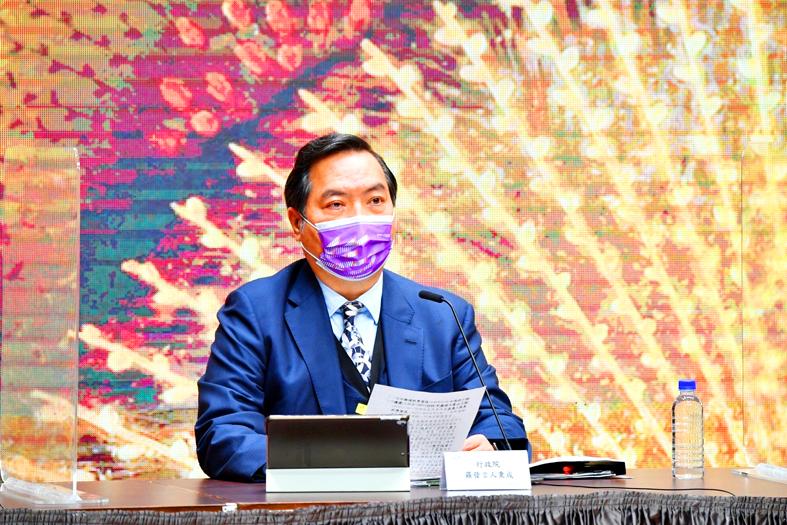The Cabinet yesterday extended its “Invest in Taiwan” initiative for three years, adding more funding and requirements to meet the government’s 2050 net-zero carbon emissions goals.
The extension of the repatriation program came amid persistent demand from Taiwanese businesses and an anticipated wave of reshoring due to changes in China’s business environment, Executive Yuan spokesman Lo Ping-cheng (羅秉成) told a news conference in Taipei after a weekly Cabinet meeting.
The initiative, which began in July 2019 and is due to expire at the end of next week, provides favorable loan terms, and assistance in accessing land, utilities and talent to firms seeking to move production to Taiwan or expand their local operations.

Photo courtesy of the Executive Yuan
As of Friday last week, the government had approved 1,109 applications from Taiwanese businesses to invest a combined NT$1.55 trillion (US$55.78 billion) under the initiative, the InvesTaiwan Service Center said last week, adding that the investment pledges are estimated to create 123,425 jobs.
With the initiative extended through 2024, the government plans to provide an additional NT$430 billion in financing for participating firms, which is expected to attract NT$900 billion in investment and create 40,000 jobs, Lo said.
As there is still NT$60 billion in unused financing for the current program, the available loans for participating firms would be NT$490 billion, Deputy Minister of Economic Affairs Tseng Wen-sheng (曾文生) said.
The government would review the size of financing on a rolling basis and adjust the loan amount as needed, Tseng said.
The Ministry of Economic Affairs said that the initiative would still provide firms with preferential loans, but it would make minor adjustments to interest-rate subsidies and the duration of the benefits for different programs.
As for the net-zero carbon emissions requirement, Tseng said that participating firms would be reviewed based on their plans to use green energy, or energy-saving or low-carbon emissions equipment; implement heat recovery or circulation; construct green buildings; and enact projects that contribute to the government’s net-zero carbon emissions goal.
InvesTaiwan Service Center chief executive Emile Chang (張銘斌) said that the government would set separate requirements for large, small and medium-sized enterprises to implement energy saving and carbon reduction programs, rather than a uniform standard.
As a result, applicants for the initiative would be reviewed on a case-by-case basis on this front, Chang said.
The announcement came after Chinese authorities last month hit Taiwanese conglomerate Far Eastern Group (遠東集團) with hefty fines for allegedly contravening regulations on environmental protection, land use, employee health, safety, taxes and product quality, while state-backed Chinese media reported that the fines were connected to Far Eastern’s role as one of the biggest donors to President Tsai Ing-wen’s (蔡英文) Democratic Progressive Party.
Many Taiwanese businesses have already exited China amid US-China trade tensions, but the Far Eastern incident, coupled with China’s stricter environmental protection and carbon reduction rules, have prompted more to participate in the government’s initiative, Minister of Economic Affairs Wang Mei-hua (王美花) said late last month.

MAKING WAVES: China’s maritime militia could become a nontraditional threat in war, clogging up shipping lanes to prevent US or Japanese intervention, a report said About 1,900 Chinese ships flying flags of convenience and fishing vessels that participated in China’s military exercises around Taiwan last month and in January last year have been listed for monitoring, Coast Guard Administration (CGA) Deputy Director-General Hsieh Ching-chin (謝慶欽) said yesterday. Following amendments to the Commercial Port Act (商港法) and the Law of Ships (船舶法) last month, the CGA can designate possible berthing areas or deny ports of call for vessels suspected of loitering around areas where undersea cables can be accessed, Oceans Affairs Council Minister Kuan Bi-ling (管碧玲) said. The list of suspected ships, originally 300, had risen to about

DAREDEVIL: Honnold said it had always been a dream of his to climb Taipei 101, while a Netflix producer said the skyscraper was ‘a real icon of this country’ US climber Alex Honnold yesterday took on Taiwan’s tallest building, becoming the first person to scale Taipei 101 without a rope, harness or safety net. Hundreds of spectators gathered at the base of the 101-story skyscraper to watch Honnold, 40, embark on his daredevil feat, which was also broadcast live on Netflix. Dressed in a red T-shirt and yellow custom-made climbing shoes, Honnold swiftly moved up the southeast face of the glass and steel building. At one point, he stepped onto a platform midway up to wave down at fans and onlookers who were taking photos. People watching from inside

Japan’s strategic alliance with the US would collapse if Tokyo were to turn away from a conflict in Taiwan, Japanese Prime Minister Sanae Takaichi said yesterday, but distanced herself from previous comments that suggested a possible military response in such an event. Takaichi expressed her latest views on a nationally broadcast TV program late on Monday, where an opposition party leader criticized her for igniting tensions with China with the earlier remarks. Ties between Japan and China have sunk to the worst level in years after Takaichi said in November that a hypothetical Chinese attack on Taiwan could bring about a Japanese

The WHO ignored early COVID-19 warnings from Taiwan, US Deputy Secretary of Health and Human Services Jim O’Neill said on Friday, as part of justification for Washington withdrawing from the global health body. US Secretary of State Marco Rubio on Thursday said that the US was pulling out of the UN agency, as it failed to fulfill its responsibilities during the COVID-19 pandemic. The WHO “ignored early COVID warnings from Taiwan in 2019 by pretending Taiwan did not exist, O’Neill wrote on X on Friday, Taiwan time. “It ignored rigorous science and promoted lockdowns.” The US will “continue international coordination on infectious